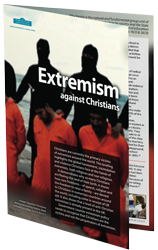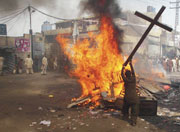Europe cannot afford to ignore the persecution of Christians worldwide, the President of the European Parliament has said.
Speaking at a conference on Tuesday that focussed on the global treatment of Christians, President Martin Schulz gave assurances that the Parliament will contribute “wherever it can” to protect Christians.
He said that the persecution of a religion is a “breach of fundamental rights”.
Systematic
Vice President of the European Parliament Antonio Tajani, who organised the conference, referred to data showing the extent of the problem.
“Every month at least 200 churches or places of worship are attacked. Every day, in every region of our planet, we register new cases of systematic violence and persecution against Christians.
No other religious community is faced with such hatred, violence and aggression as is the Christian community
Vice President,European Parliament
“No other religious community is faced with such hatred, violence and aggression as is the Christian community”, Tajani said.
Persecution engine
He called for Europe to promote “a model of society in opposition to religious radicalism and brutal and criminal projects”.
Speakers at the meeting highlighted the work of Open Doors, a Christian charity working to help persecuted believers.
The charity’s 2015 report found that “Islamic extremism is by far the most significant persecution engine” of Christians in the world today.
New briefing

The conference was held under Article 17 of the EU Treaty, on inter-religious dialogue, and featured a contribution from the US ambassador to the EU Anthony L Gardner.
The Christian Institute’s new briefing ‘Extremism against Christians’ highlights the global harassment, intimidation and violence Christians face at the hands of extremists, both religious and non-religious.
It shows there is a level of anti-Christian extremism already present in the UK, and seeks to demonstrate that Christians are the victims of extremism, not the perpetrators.

